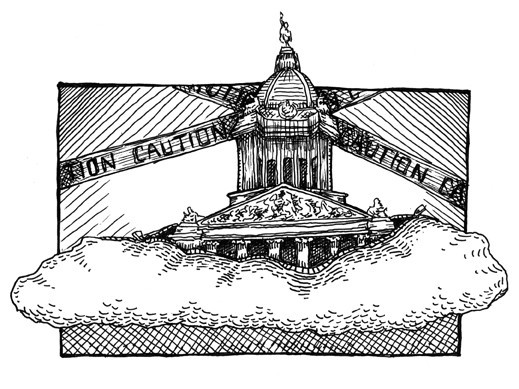Stephen Harper, denier of colonialism
Fresh off criticism of Iranian leader, PM contradicts himself again
Stephen Harper has a nasty habit of hypocrisy. If his political career thus far can be typified by anything, it is his eagerness to surrender his values to the throne of power.
Examples abound. For instance, though he fervently advocated for the creation of an elected Senate – both as the leader of the National Citizens Coalition and as a leader of the official opposition – as Prime Minister, he has instead engaged in a deluge of recent Senate appointments.
For the majority of his public life, Harper has celebrated the virtues of the uninhibited free market without waver. Yet, when the coalition axe threatened to come down on his government last winter, a brazen PM emerged from the rubble content to lecture the rest of the world’s capitalist economies on the necessity of sensibly regulated banking systems – almost as though they had been his idea to begin with.
And then there was Harper at the G20 Conference last month in Pittsburgh. Fresh off reprimanding Iranian President Mahmoud Ahmadinejad at the United Nations for, amongst many other things, Ahmadinejad’s reputation as an eminent Holocaust denier, Harper then uttered perhaps the most hypocritical decree of his career. In front of the leaders of the 20 richest countries in the world, Harper attempted to doctor Canada’s history by claiming that “we [Canada] have no history of colonialism.”
Come again?
This claim would be laughable if it did not display a disturbing cleansing of Canadian history, by its elected leader no less.
Now, Harper has proven himself to be ferociously inept at reading Canadian history before. Once again, during the “coalition crisis” of 2008, he endlessly reiterated that the attempted seizure of power was undeniably unconstitutional. As constitutional experts and everyday Canadians with some knowledge of how a parliamentary government operates began to refute his absurd claim, the PM switched tactics towards the more familiar drumming up of a “socialist and separatist” scare.
So when Harper chose to deny centuries of the sequestering, thieving, attempted assimilation and extermination of Canada’s aboriginal peoples, a blue believer might have chalked such a dim-witted comment up to Harper’s apparent preference of opportunism over truth. After all, he was in the company of the most economically powerful nations in the world, so why not trumpet Canada?
The trouble is that his denial of the systematic expulsion, denigration and dispossession of Canada’s original inhabitants is in league with the filth spewed out by Ahmadinejad when he speaks of the Holocaust as “a lie based on an unprovable and mythical claim.” Denying deliberate attempts to eliminate a population is abhorrent, regardless of the situation or the country in question.
But the question which remains to be asked of our dear leader – so far unasked by a silent Canadian media – is how Harper can justify such a blatant lie as Canada having no history of colonialism given his residential school apology of 2008?
While the residential school system was only one part of Euro-Canada’s attempt to solve “the Indian problem,” it nonetheless was an explicit expression of the belief that aboriginals were a population to be coerced into subservience to the Canadian state. We see the modern day expression of this belief with the continuance of the administration of aboriginals through the reservation system and The Indian Act.
As Harper himself said in his residential school apology, the goal of the school system was to “isolate children from the influence of their homes, families, traditions and cultures, and to assimilate them into the dominant culture.”
If Harper’s own residential school apology alone does not admit Canada’s history of colonialism, I don’t know what does.
Andrew Tod is a University of Winnipeg student.
Published in Volume 64, Number 6 of The Uniter (October 8, 2009)







